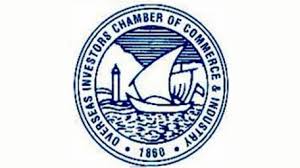–Overhaul in tax policy, implementation of IP rights law, change in perception necessary for investment growth
LAHORE: Overseas Investors Chamber of Commerce and Industry (OICCI) President Khalid Mansoor spoke about his concerns on Foreign Direct Investment (FDI) trend in the country in a media meeting held here on Thursday, October 12.
He said that the foreign investors not only look at profit motives but also at the consistency and reliability of the business environment.
Talking about FDI in Pakistan, he said that though the inflow of Foreign Direct Investment (FDI) to Pakistan in the fiscal year 2016-17 has increased by 4.5 per cent to $ 2.4 billion compared to $ 2.3 billion in 2015-16, the FDI remains very low and not even 1 per cent of the GDP of the country whereas it should be at least 3 per cent.
He added, “Pakistan needs to leverage its business-friendly policies and a number of other positive potentials, including large investment under CPEC, to ensure FDI inflows on a scale similar to its peer countries in the region.”
OICCI CEO and Secretary General M Abdul Aleem also spoke on the occasion and presented key highlights of the Chamber’s bi-annual Business Confidence survey – wave 14, carried out in April and released in May 2017, which indicates a downward trend with Business Confidence score (BCS) of 13 per cent vs 17 per cent in November 2016 and 36 per cent in April 2016. Abdul said, “Employment is the main indicator of whether businesses are doing good or not and how the economy is shaping.” He said that the recent fall in business confidence index also came as a result of the energy crisis and the security situation in Balochistan.
The confidence of OICCI members in the BCI wave 14 was down by 9 per cent as compared to last November 2016 survey, but with a BCS of 37 per cent in the April survey, OICCI members continue to maintain positive sentiments. Next BCI survey – wave 15 – is currently underway and the results are expected to be announced in November.
Elaborating on the low level of FDI, Abdul highlighted that the country is currently not getting its due share of FDI mainly on account of few key impediments, which include negative perception overriding positive facts about Pakistan, poor rating in the World Bank “Ease of doing business” (EODB) survey (144/189), inconsistent taxation policies focused on organised sector and lately affected by ad-hoc actions like the one announced in the past three years including new levies like 3-4 per cent Super Tax, insufficient interaction between government policymakers and investors causing delays in settlements of legitimate issues like tax refunds, and circular debt in the oil and power sector.
He said that from a score of 75 in 2010, Pakistan has fallen down to 144 in 2016 among 189 countries in Ease of Doing Business Index. He said that this is due to more than 15 years the stagnant measures and procedures, which have become inefficient, but due to reforms, other countries have climbed up the rankings.
He also informed that Pakistan is at 172 on the tax payment index which further discourages foreign investors when they find it difficult even to get tax refunds.
The OICCI further pointed out issues such as confusions between PSQCA and Punjab Food Authority, amidst poor implementation of the intellectual property rights protection law.
OICCI compromises of top 200 foreign investors from 35 countries, including 50 from Fortune 500 companies. OICCI members contributed over one third in total taxes last year and invested over $ 2.3 billion.
OICCI President who is also the CEO of the Hub Power Company (HUBCO) also shared that development of Thar project would add 660MW by 2019 with a similar project for 2020. Currently, the coal power plants are of 3.8 million tonnes per annum capacity each. He said that Thar contains 1.6 billion tonnes of confirmed reserves and said that these only comprise 1 per cent of the total resources of Thar.




